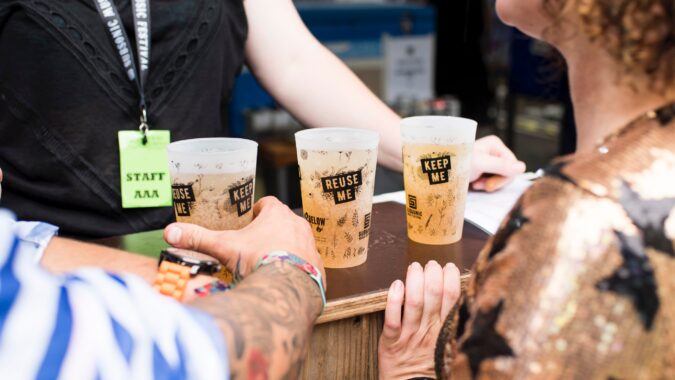Top Festival Waste Management Tips
Festival waste has been a big challenge for decades. Photos of abandoned tents, trampled food waste, empty beer cans and plastic bottles littering muddy fields follow each instance of Glastonbury, Reading and Leeds festivals, and Parklife every year. The amount of waste created isn’t the worrying thing though – it’s what happens to it.
A shocking 68% of waste ends up in landfill that’s produced at UK music festivals annually. Effective festival waste management could significantly reduce that and ensure as much as possible is recycled and reused. And it’s not just the big festivals, the likes of local beer festivals, summer fairs, and street carnivals all need strong waste management plans.
Understand how to overcome the challenges of festival waste whatever size, type, and length of festival you’re holding. Use the following top tips for successful, smooth, and stress-free festival waste management.

Festival waste statistics and facts
We’ve pulled together some important festival waste statistics to provide a good idea of how much waste festivals produce and the amount that’s disposed of improperly:
- UK music festivals produce 23,500 tonnes of waste every year – equivalent to the weight of 250 blue whales.
- It’s sadly estimated that 68% of waste created at UK festivals ends up in landfill, even though much of it could be recycled.
- 400 tonnes of food waste created at festivals end up in landfill, according to The Nationwide Caterers Association.
- Waste created by individuals every day at festivals has fallen – from 2.8kg per person per day in 2014 to 2kg in 2019, according to The Show Must Go On report.
- 250,000 tents are left behind at UK music festivals every year, according to The Association of Independent Festivals (AIF).
- Around 90% of tents left behind at festivals end up in a landfill site or an incinerator.
- Recycling rates for festival attendees are only around 30%, according to research by A Greener Festival.
- Glastonbury estimates that the festival generates around 2,000 tonnes of waste every year the festival is held.
- Major US festivals such as Coachella create about 100 tonnes of solid waste each day.
- Oya festival in Norway is one of the greenest – food and drink are served in 100% compostable packaging and more than 60% of waste generated is reused in new products.
Avoid adding to these statistics by using the following tips to manage your festival waste effectively.
Create an effective
festival waste management plan
Putting together a festival waste management plan is essential before running any event. It means you can assess your festival, identify potential problem areas, and take a proactive approach to minimise waste-related risks. This vital document should cover everything you need to ensure smooth waste management.
A good place to start is to ask existing and successful festivals of a similar size, type, and location if you can see their waste management plan. You can use this as a blueprint and at the same time ask if they’ve got any advice or useful information about managing waste from their experiences.
Otherwise, you can create your festival waste management plan from scratch. Use information such as ticket sales, the maximum capacity, the number of vendors and staff, details of the site, and any data from previous events to inform your plan where possible.

Your festival waste management plan should cover:
- Who will remove your festival waste – licensed waste carriers must remove all waste produced at any festival, as it’s a type of commercial waste. Most festivals use third-party professional waste management companies.
- Bin delivery and removal times – the frequency and timings of festival waste removal are vital to avoid excess waste onsite. You also need to ensure they’ll arrive with plenty of time to place them across the site.
- Locations of each bin – include a map in your festival waste management plan that details where every bin will be placed. This helps determine how many bins you need and build an effective plan.
- Types of bins and waste containers – work out the best types, sizes, and number of bins you’ll need onsite. This should include bins for festival attendees, as well as for vendors and other backstage operations.
- Waste types – information about the individual waste types you predict the festival will create and the split between them. It should highlight recycling opportunities and inform the types and sizes of bins you’ll need.
- How will waste be removed – determine who is responsible for moving any bins to the pickup point. Include details of access for waste removal trucks and a map of accessible routes, gates, and any security requirements.
- Vendors’ waste – will any food vendors, merchandise stalls, and others arrange the removal of their own waste? If so include details of their responsibilities.
- Budgeting and costs – outline your budget for the festival and how much is allocated to waste management. Include estimated costs to help ensure your festival is feasible and waste removal costs won’t mean you go over budget.
- Backup and risks – identify any risks and hazards that could affect your waste management plan running smoothly. Have backup options in case of an emergency (such as overfull bins or missed collections).
- Festival statistics – include the number of attendees, capacity, size of the festival site, and any other important information.
Separate types
of festival waste
Outline the types of waste you expect your festival will create to ensure the correct bins and containers are in place to separate them at the point of production. Identify those that are recyclable to help set up recycling stations across your festival. Depending on the expected volume you might use dry mixed recycling bins to combine recyclable rubbish.
Common types of festival waste you should provide individual bins for to separate and reduce the amount of rubbish going to landfill include:
- Festival food waste – vendors and consumers create food waste that needs storing separately so it’s sent for anaerobic digestion and to generate energy.
- Metal waste – aluminium drinks cans and empty food tins can be recycled so should be stored in separate bins or dry mixed recycling.
- Paper and cardboard – food packaging, drinks carriers, and receipts make up lots of paper and cardboard waste at festivals that should be recyclable.
- Glass waste – many festivals ban glass, but food vendors may still have empty glass jars for ingredients and drinks, which needs storing separately for recycling.
- Plastic recycling – drinks bottles, plastic cups, and food packaging should be recycled where possible. This can be in individual plastic bins or with dry mixed recycling.
- General waste – food scraps and non-recyclable rubbish like used tissues and wipes need to be disposed of in general waste bins.
- Sanitary waste – toilets and any bathroom facilities must have sanitary bins in place to safely store various types of offensive waste. This helps protect human health and the environment.
Encourage recycling
Having a range of recycling bins onsite is the first step to reducing your festival waste. These need clearly labelling with the specific recyclable rubbish they’re designed to hold. Use different coloured bins for each waste type to reduce the risk of cross-contamination and encourage segregation.
Place clear signs around the site directing towards recycling bins and add the recycling station to any site maps. For all vendors, you should also have a recycling policy in place outlining their responsibilities. Provide enough recycling bins for each vendor and stall so they also recycle as much as possible.
The best way to encourage recycling at a festival is to lead by example too. Serve drinks in recyclable or compostable plastic or paper cups, use recyclable or biodegradable cutlery and plates, and eliminate all single-use plastic. Requiring vendors to follow such guidelines can significantly increase recycling rates across your festival.

Choose convenient bin locations
Make recycling and waste disposal as easy as possible for festival goers and vendors to manage rubbish effectively. Placing food waste, general waste, and mixed recycling bins close to food and drinks stalls makes sense, as it’s where plenty of rubbish is produced. Festivals with camping facilities should also ensure bins are near enough tents (but not too close!).
Any litter can easily be picked up by the wind and drift offsite, polluting local water, ground, and air – as well as affecting wildlife. The more bins you have, and the less work/walking required for people to dispose of rubbish, the reduced risk of waste negatively impacting the environment.
Also, consider access when choosing bin locations. They need to be placed somewhere that waste removal trucks can reach easily or with access to a clear path or road, so any wheelie bins can be moved down to the pickup point conveniently.
Train and prepare
a waste team
Unfortunately, there’ll always be some people who don’t use the right bins (or any bins at all!), no matter how hard you try to control consumer waste at your festival. This can result in empty plastic cups, food packaging, paper plates, and more being littered across the site.
Assemble a team dedicated to festival waste management to combat those rogue festivalgoers. Include litter pickers to reduce the amount of rubbish that could fly off the site and negatively impact the local environment. Also, have professionals overseeing the wider waste operations – ensuring bins don’t overflow, access routes are clear, and collections happen on time.
Most festivals either pay their dedicated waste management team or enlist the help of volunteers by providing free tickets. Have a rota to ensure staff aren’t overworked and have enough time to enjoy the festivities. The best option depends on the size, type, popularity, and budget for your festival.

Store festival waste securely
Secure bins, bags, and containers are essential to prevent waste from blowing out in the wind, getting wet from the rain, or experiencing any other damage. You also need to store all festival waste in sensible locations before collection. Placing them under a canopy and on solid ground can reduce any adverse weather effects.
You’ll need to place wheelie bins onsite for festivalgoers to use. However, it could be safer and more cost-efficient to have larger bins backstage that these are emptied into regularly. This reduces the amount of waste attendees are exposed to, means you can arrange less frequent collections, and the bins are likely to be opened and exposed less often.
Common bins to secure festival waste securely include:
- Wheelie bins – two- and four-wheel bins are used to separate recyclables and waste types. Each type has lids (some are lockable) and can be easily wheeled around to empty into larger bins or move to collection points.
- Front and rear-end loaders – these are large bins that can hold up to 160 bags of waste. They’re static, so can’t be moved, but if you have space and access are a good option to combine waste in one place to reduce collections.
- Commercial waste bags – another easy way to separate festival waste and recycling types is with commercial waste bags. These may be used inside your festival bins or on their own for everything from general waste to mixed recycling.
Arrange festival waste removal
at a convenient time
Ensure you book delivery of all bins, bags, and containers well in advance of your festival, so they can be placed on site in good time. Waste collections should be arranged with as little disruption to festival goers and vendors as possible. If you’re running a one-day event, it makes sense to do this the following day.
For multi-day festivals, you might need waste collection across the weekend. Arrange these at the quietest times when access routes should be clear. This avoids delaying the removal of your festival waste, reduces the risk of accidents, and empties bins before they become too full (which can be a health hazard and result in overweight charges).

Use expert help for your
festival waste management
Hopefully, you now have a better idea of how to manage your festival waste effectively. For further expert help and advice about festival waste management – and a free no obligation quote – speak to one of our team. Call 0800 211 8390 or contact us online today or find out more about event waste management.
Have your waste collected
Get a fast FREE quote for your waste collection 0800 211 83 90
- Free quote within 1 hr
- Any type of waste
- FREE bins and delivery
- We cover all of the UK